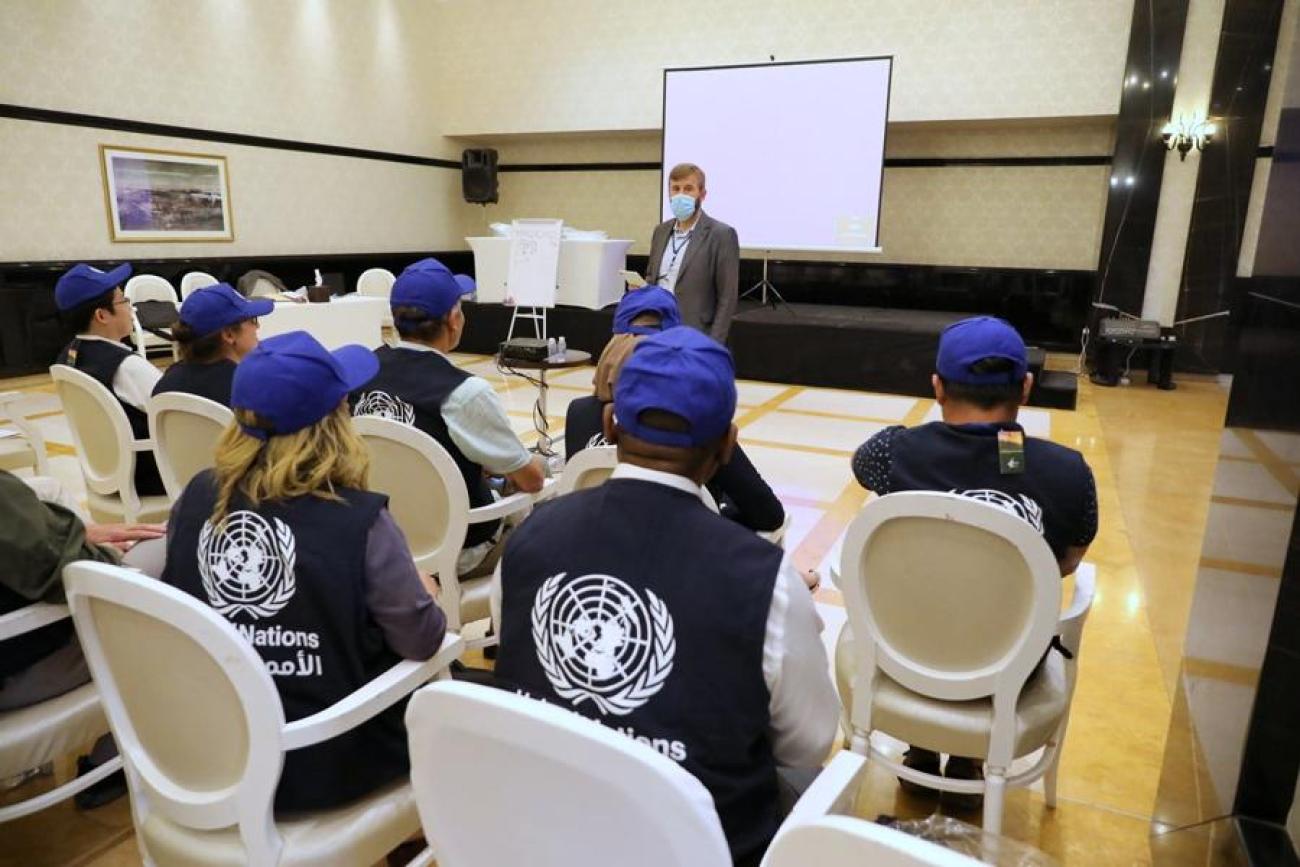Bringing in international expertise in support of Iraq’s parliamentary elections

They further recognized the role of the UN Assistance Mission for Iraq (UNAMI) in providing "technical assistance and international monitoring"
In October 2021, the people and Government of Iraq successfully concluded the country’s latest parliamentary elections. The members of the United Nations Security Council commended Iraq’s Independent High Electoral Commission (IHEC) for "conducting a technically sound election." They further recognized the role of the UN Assistance Mission for Iraq (UNAMI) in providing "technical assistance and international monitoring" in support of the electoral process. The international experts with UNAMI's Office of Electoral Assistance (OEA) included 15 dedicated UN Volunteers.
This group of UN Volunteers (six women and nine men) was part of a team comprising one thousand personnel during the peak period of the elections – described as "the biggest electoral assistance mission in the history of UN’s practice worldwide," according to Dr Aamir Arain Aamir, Director of UNAMI Electoral Assistance and UN Principal Electoral Advisor. However, these volunteers "were a significant part of this undertaking, serving in both substantive, technical and administrative aspects of the complex electoral assistance programme," adds Dr Arain.
The UN Volunteers were distributed between Baghdad and five other regions of the country, supporting IHEC’s nineteen Governorate Elections Offices (GEOs). Their much-valued contributions were part of a broader commitment to election transparency, upon which Iraq's nascent peacebuilding endeavours depend.
The elections process was also a unique experience – a long-awaited thread of hope for people with differences who found a common ground. UN Volunteers Lucie Mukarumashana and Zarina Isakova are esteemed for their prior electoral experience in Afghanistan, civic education acumen and expertise in outreach and communications.
As women, their presence among international teams further promotes gender equality in the public sphere and dovetails new election laws requiring women to comprise 25 per cent of the elected members for the Council of Representatives (parliament).
Throughout the electoral process Lucie and Zarina engaged closely with their Iraqi counterparts at the International High Electoral Commission and Governorate Elections Office providing advisory support and injecting fresh ideas.
Lucie served as a Regional Electoral Officer in Nineveh – which Dr Arain describes as a very challenging duty station, politically, in terms of operations. There, she helped establish and maintain communication channels between IHEC offices, supported recruitment and training of polling teams and reviewed logistical and security preparations.
She also developed reports with lessons learned that ensured electoral actors could adapt, localize and improve electoral processes in real-time. These processes were further augmented by simulations, site visits and complaints mechanisms, which Lucie also followed up closely before the election was held. Her efforts helped ensure concerns and challenges were resolved with credibility and public trust in the elections process could flourish.
Back in Baghdad, Zarina contributed to communication flow between institutions and supported UNAMI's Office of Electoral Assistance. Her progress reports, including daily and weekly election updates, made data accessible to senior mission management, diplomatic community and multinational teams, as electoral preparations and electoral assistance activities moved forward.
In addition, UN Volunteer Dinesh Pathak further supported communication efforts, with a particular focus on IHEC field offices. As a Field Coordination Officer, based in Baghdad, Dinesh worked within a team that managed and coordinated 19 field offices’ activities. He conducted site visits, assessed the Governorate Election Office’s logistical and security readiness, while also observing and documenting electoral activities and participation, including women's participation.
Like Lucie and Zarina, Dinesh had previously supported UN Missions in Afghanistan and other countries, bringing vital field experience contributing to the development of an electoral education and information center for all regional offices.
Together, these UN Volunteers helped the IHEC to complete electoral preparations in a timely manner and to increase the awareness of and participation in a credible parliamentary election.
Alongside the above-cited UN Volunteers, there were several others with legal, medical, COVID-19 mitigation and technology expertise, who supported the largest electoral assistance mission the United Nations has ever undertaken. That mission covered technical assistance, as well as election day monitoring, strategic communication, and coordination/support for third-party observers. Therefore, the value added to the work of UNAMI's Office of Electoral Assistance cannot be overstated.
UN Volunteers performed key functions and have knowledge of elections processes acquired in several countries over many UN missions. They were eager to contribute and delivered their expertise and support to a challenging and complex undertaking by UNAMI OEA. They played a vital role to make these efforts a resounding success. --Dr Aamir Arain Aamir, Director of UN Integrated Electoral Assistance and UN Principal Electoral Advisor
Indeed, as Iraq sought to prepare, operate and monitor a new election, UN Volunteers arrived with solidarity and camaraderie. Their support for Iraq’s election as part of international assistance helped the people of Iraq foster the hope of peace.


